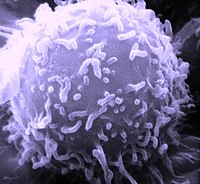
Photo from wikipedia
Mycobacterium tuberculosis (M. tb) persists as latent infection in nearly a quarter of the global population and remains the leading cause of death among infectious diseases. While BCG is the… Click to show full abstract
Mycobacterium tuberculosis (M. tb) persists as latent infection in nearly a quarter of the global population and remains the leading cause of death among infectious diseases. While BCG is the only vaccine for TB, its inability to provide complete protection makes it imperative to engineer BCG such that it expresses immunodominant antigens that can enhance its protective potential. In-silico comparative genomic analysis of Mycobacterium species identified M. tb Rv1507A as a “signature protein” found exclusively in M. tb. In-vitro (cell lines) and in-vivo experiments carried out in mice, using purified recombinant Rv1507A revealed it to be a pro-inflammatory molecule, eliciting significantly high levels of IL-6, TNF-α, and IL-12. There was increased expression of activation markers CD69, CD80, CD86, antigen presentation molecules (MHC I/MHCII), and associated Th1 type of immune response. Rv1507A knocked-in M. smegmatis also induced significantly higher pro-inflammatory Th1 response and higher survivability under stress conditions, both in-vitro (macrophage RAW264.7 cells) and in-vivo (mice). Sera derived from human TB patients showed significantly enhanced B-cell response against M. tb Rv1507A. The ability of M. tb Rv1507A to induce immuno-modulatory effect, B cell response, and significant memory response, renders it a putative vaccine candidate that demands further exploration.
Journal Title: Frontiers in Immunology
Year Published: 2020
Link to full text (if available)
Share on Social Media: Sign Up to like & get
recommendations!